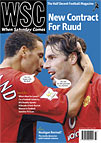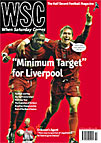 Dear WSC
Dear WSC
I enjoyed the articles on the links between football and rap (WSC 204). One important connection has been overlooked, however. In a slightly surreal interview on Liverpool’s official site from 2001, Dr Dre reveals himself as a fan of the (his words) “cool cats in red”. At the time of the interview, Dre’s Liverpool favourite was Michael Owen, though he says he was first attracted to the Reds by John Barnes. “He was bad,” Dre explains. “Kinda reminded me of Magic Johnson.” He goes on to describe Robbie Fowler and Jamie Redknapp as “old school” and Czech midfielder Patrik Berger as “the bomb”. How long will it be before Eminem admits that Tomas Repka is a role model?
Sam Beckwith, Prague, Czech Republic
Search: 'Paul Ince'
Stories
 Lincoln’s Keith Alexander, back at work after brain surgery, is one of only three black managers in the league. Grahame Lloyd asked him why he thought this was so
Lincoln’s Keith Alexander, back at work after brain surgery, is one of only three black managers in the league. Grahame Lloyd asked him why he thought this was so
Keith Alexander knows he’s very lucky to be alive. Just three months after undergoing major brain surgery following a collapse at his home, the Lincoln City manager was due back in the dugout for the home derby against Boston on February 7. Alexander could hardly have chosen a more volatile atmosphere for his return but, with Lincoln’s next three matches pitching them against neighbours Scunthorpe and Hull as well as promotion rivals Huddersfield, all their games this month are high-profile and high-octane.
 Despite only recently joining England's elite in the Premier League, Birmingham City are a club with big ambitions. Blues supporter Kenneth Jones explains why their rivalry with Villa has been all the more intense recently and why the rapid increase in ticket prices has dissuaded some supporters
Despite only recently joining England's elite in the Premier League, Birmingham City are a club with big ambitions. Blues supporter Kenneth Jones explains why their rivalry with Villa has been all the more intense recently and why the rapid increase in ticket prices has dissuaded some supporters
Could City’s crowds get much bigger than now?
Undoubtedly. City have big local support and, since promotion, more season-ticket holders than Villa. With the team on the up, the only problem might be the mystifying decision to increase standard ticket prices by £10, meaning tickets for games which would have been rapid sell-outs last year have been available on general sale leading up to the match. Any increase in crowd sizes is also constrained by the 30,000 capacity at St Andrew’s, but many would agree there is little point having a brand new £12 million main stand in Division One.
 Dear WSC
Dear WSC
I notice that Steve Ducker (WSC 203) believes that UEFA will be “100 per cent responsible” for any crowd trouble that occurs in Portugal as a result of the England v Croatia game being moved from Coimbra to Lisbon. Funny that, as I always thought xenophobia and heavy drinking had a role to play in these situations. UEFA’s decision seems to make sense on this occasion (as does the moving of the Germany v Holland game to Porto’s stadium). The Lisbon and Porto police forces are the only ones with any real experience of large crowds with a potential for trouble (the so-called classicos when Porto, Benfica and Sporting play each other) and those cities have had virtually all the dealings with foreign football fans in recent years. Furthermore, as Coimbra is only just over an hour from Lisbon and with limited accommodation, it would be safe to assume that many England fans will be basing themselves in Lisbon for the tournament. Incidentally, weren’t UEFA criticised for holding the Engand v Germany game in Charleroi in 2002, as the ground was too small and the size of the town ensured that it was easy for large groups of fans to congregate together? However, if there is trouble then there may be other people for us all to blame. How about the Portuguese bar and cafe owners for selling their beer too cheaply and for making their outside tables and chairs too easy to throw around?
Matthew Guest, Porto, Portugal
 The team with most points winning the league? The teams with fewest going down? As Robert Shaw writes, that hasn’t been the way in Rio and São Paulo – until now
The team with most points winning the league? The teams with fewest going down? As Robert Shaw writes, that hasn’t been the way in Rio and São Paulo – until now
In the highly political world of Brazilian football, two developments received universal acclaim in 2003. First, Palmeiras and Botafogo, two traditional powers, were promoted back to the 24-team top flight a year after relegation. Earning a return on the field, rather than through negotiations in a smoke-filled room, won plaudits for both clubs, who had not been expected to tolerate the humiliation of second division football.